Sports event management software is designed to streamline the planning, organization, and execution of sporting events, catering to event organizers, participants, and fans alike. This software facilitates tasks such as registration, scheduling, ticketing, and communication, enhancing the overall experience for everyone involved.
By integrating features like real-time updates, analytics, and social media connectivity, it enables organizers to manage logistics and engage with audiences efficiently.
As the sports industry evolves, leveraging technology becomes essential for maximizing operational efficiency and delivering memorable events. Thus, stakeholders in the field are making the development of robust, user-friendly software solutions a priority.
Sports event management software development involves creating a digital platform that simplifies and automates the tasks of planning, organizing, and executing sports events.
This software helps streamline operations such as event registration, scheduling, participant management, and real-time updates.
By integrating various modules and features, it ensures that all aspects of event management are well coordinated and efficient.
Organizations of any size can benefit from this software by reducing the complexity and manual effort involved in running sports events.
Sports event management software functions by providing organizers with a centralized platform that integrates multiple event management tasks.
Users can create events, manage participants, schedule games, and allocate resources using a unified interface.
Real-time tracking of registration, automated communication alerts, live score tracking, and ticketing features further simplify the event workflow. Cloud integration ensures data is accessible anytime, anywhere, making it easy to coordinate large-scale sporting events.
The sports software industry has seen significant growth due to the increasing demand for digital solutions in event management.
According to market research, the global sports management software market was valued at around $6 billion in 2023 and is expected to grow at a CAGR of 13% over the next few years. Sports organizations, from local leagues to professional tournaments, are increasingly adopting these solutions to improve efficiency, save time, and reduce costs.
Understand the needs of the event organizers and participants to define the software’s scope and features.
Create a user-friendly interface with intuitive navigation for both desktop and mobile users.
Start building key modules like registration, scheduling, and team management using modern technologies.
Conduct rigorous testing to identify bugs and ensure the software performs well under different scenarios.
Launch the software on cloud-based servers for easy access and scale it to accommodate a growing number of users.
Provide ongoing support to fix bugs, improve performance, and release new features based on user feedback.
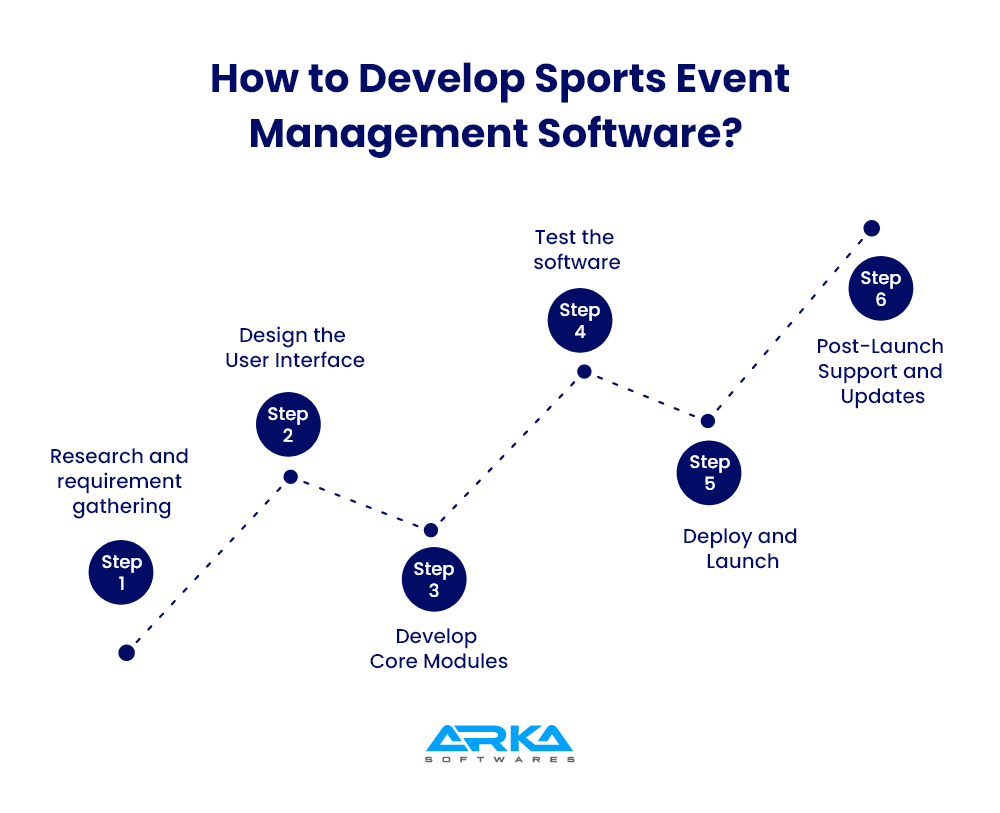
ClearEvent offers a comprehensive platform that covers event planning, registration, and scheduling. It’s designed for multi-day sports events and allows easy communication with participants and volunteers.
RedPodium specializes in registration and ticketing, offering customizable forms and templates that suit various sports events. The platform also provides a seamless payment integration option.
AudienceView focuses on ticketing and marketing for sports events, offering extensive analytics on audience engagement. It helps organizers track sales performance and optimize ticketing strategies.
Known for its ease of use, Eventbrite offers features for both small and large-scale events. It integrates with social media platforms, making it ideal for promoting sports events and selling tickets.
iventis provides a solution for event planning and logistics, focusing on venue management, team coordination, and ticketing. It’s widely used for international sports events requiring detailed planning.
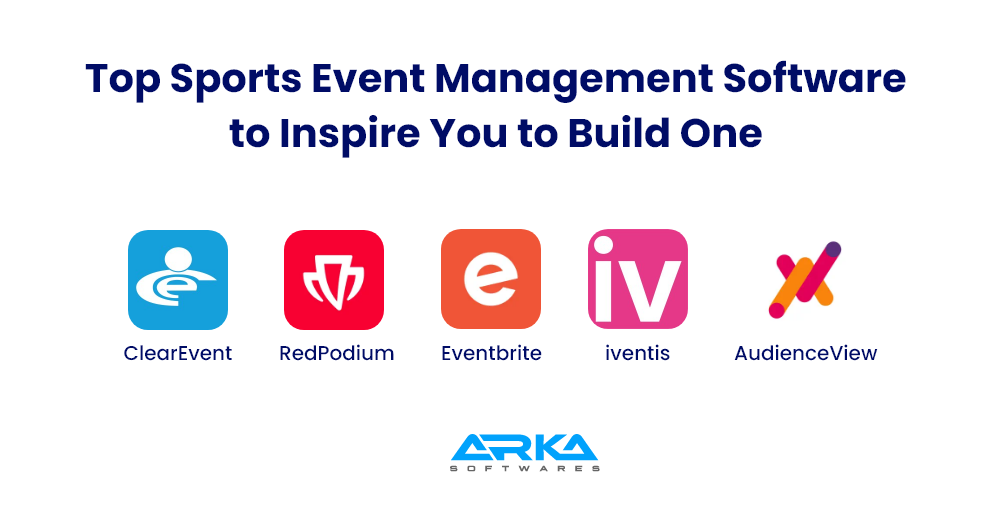
This module allows online sign-ups for athletes, teams, and officials. Customizable registration forms and payment gateway integration make it easy to collect fees and provide automated confirmation emails.
Create event schedules, allocate venues, and manage game brackets with this module. It handles conflicts and allows drag-and-drop rescheduling with automatic updates sent to participants.
Manage team rosters, assign roles, and ensure player eligibility using this module. It also enables real-time check-in and tracks individual athlete profiles for compliance and medical record submission.
This module manages venue bookings, tracks availability, and generates reports for seating arrangements. It integrates with maps for participant navigation and handles overbooking scenarios.
Organizers can assign tasks to volunteers, schedule shifts, and track hours. This module provides volunteer check-in/check-out, performance reporting, and communication tools for real-time updates.
Sell tickets online with customizable pricing and seat selection. The module integrates with payment gateways, tracks real-time availability, and generates e-tickets with QR codes for entry.
Manage sponsorship deals and track the visibility of sponsor ads during the event. This module allows the creation of sponsorship packages and generates reports on sponsor engagement and ROI.
This module automates real-time updates via email, SMS, or push notifications. It enables two-way communication between staff and participants, ensuring everyone stays informed.
Handle payments for registrations, tickets, and merchandise using this module. It integrates with multiple payment gateways, manages refunds, and generates financial reports for income and expenses.
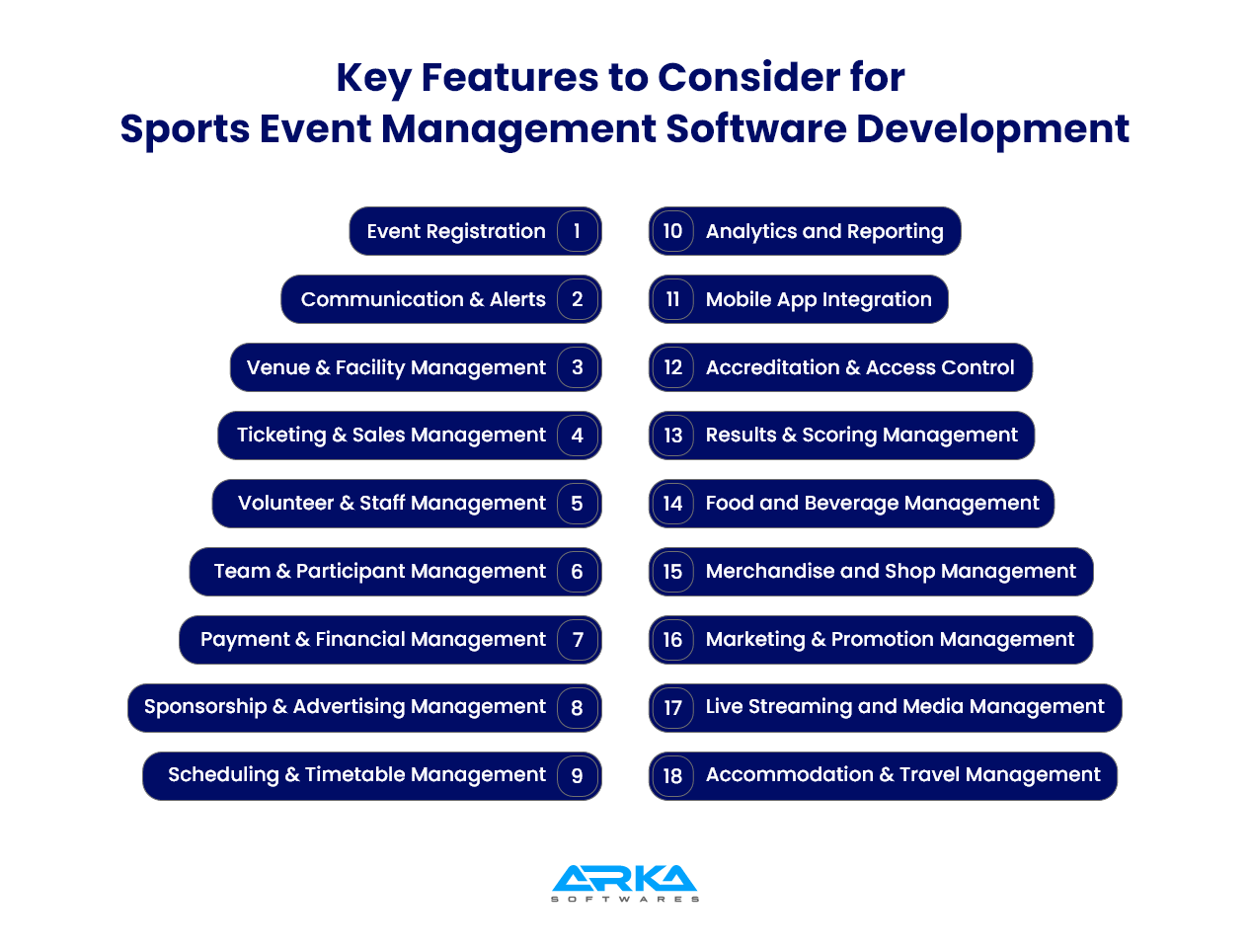
Track and update game scores in real-time with this module. It supports various sports scoring systems, updates leaderboards automatically, and generates post-event results reports.
Manage access to event zones by issuing digital passes and badges. This module integrates with RFID and QR scanners, ensuring secure and efficient entry management.
Offer live streaming of events, schedule broadcasts, and provide on-demand replays. This module helps track viewership metrics and offers premium streaming options for fans.
Manage online merchandise sales during events with real-time inventory tracking. The module integrates with e-commerce platforms and allows adding merchandise options to registrations or ticket packages.
This module provides detailed analytics on event KPIs, such as attendance, ticket sales, and finances. Custom reports help organizers assess the event’s success and identify areas for improvement.
Provide participants with a mobile app that offers real-time updates, ticket purchases, and schedule notifications. It enhances engagement by allowing users to check results, access media, and receive push notifications.
Track and manage event promotions, integrate with social media, and send automated promotional emails. This module allows the use of discount codes and measures campaign effectiveness.
Offer participants accommodation and travel options by partnering with hotels and agencies. The module tracks bookings, sends reminders, and provides travel-related updates.
Manage meal plans and track dietary preferences of participants. It also integrates with payment systems for food purchases during events and provides reports on food consumption.
Also read: How to create a sports streaming app like sportsurge effectively?
Investing in custom sports event management software brings numerous benefits, including operational efficiency, better participant experience, streamlined financial management, and improved data tracking. Custom software development also allows integration with other tools, such as analytics platforms and social media, providing a holistic solution for organizers.
Moreover, it reduces manual effort, enabling event staff to focus on core activities.
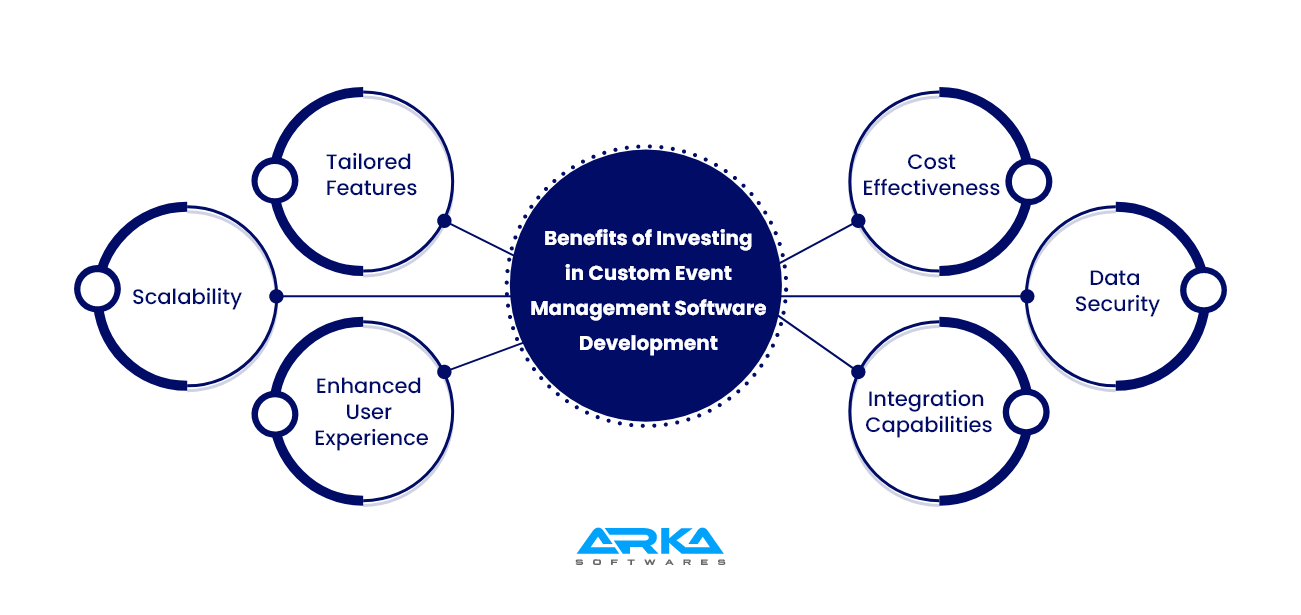
Here are the benefits of investing in custom event management software development:
To develop sports event management software, you need a combination of technologies:
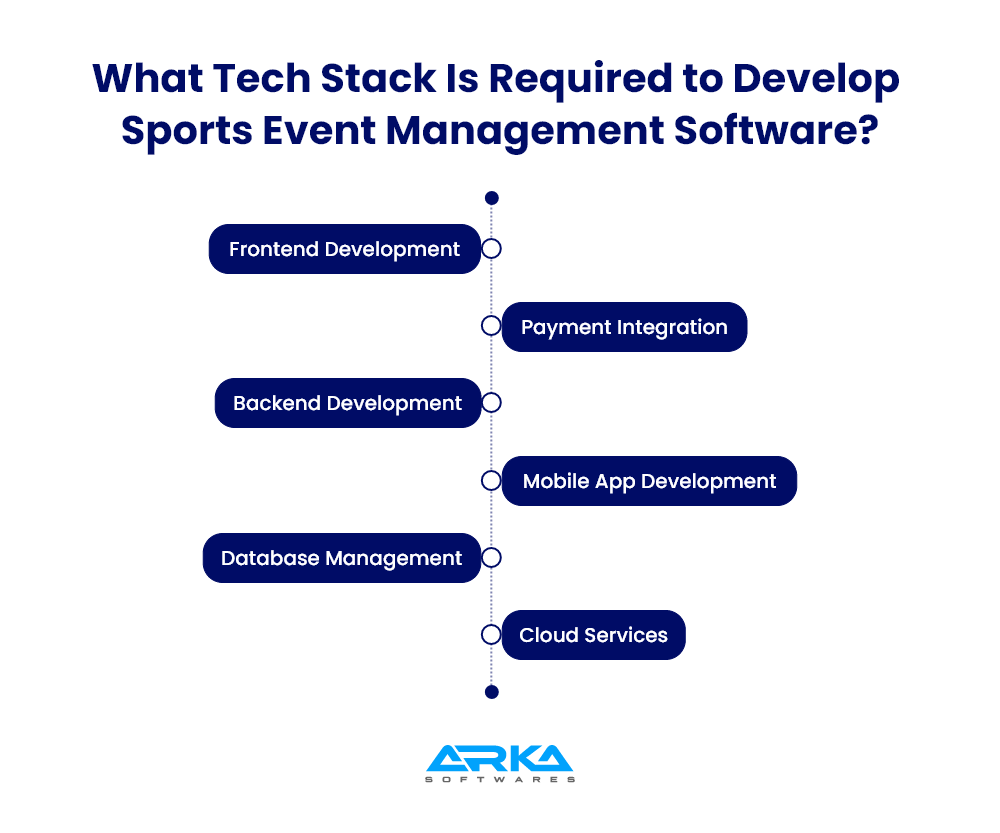
In today’s digital world, providing an event management app for iOS and Android is essential. A mobile app enables participants, volunteers, and staff to access schedules, receive updates, and manage tasks on the go. Push notifications keep everyone informed about real-time changes.
The cost of developing sports event management software can range from $30,000 to $200,000, depending on the features, technologies, and complexity. Customizations, mobile app integration, and live streaming can add to the cost, but they provide greater flexibility and a better user experience.
To develop sports event management software, you will need:
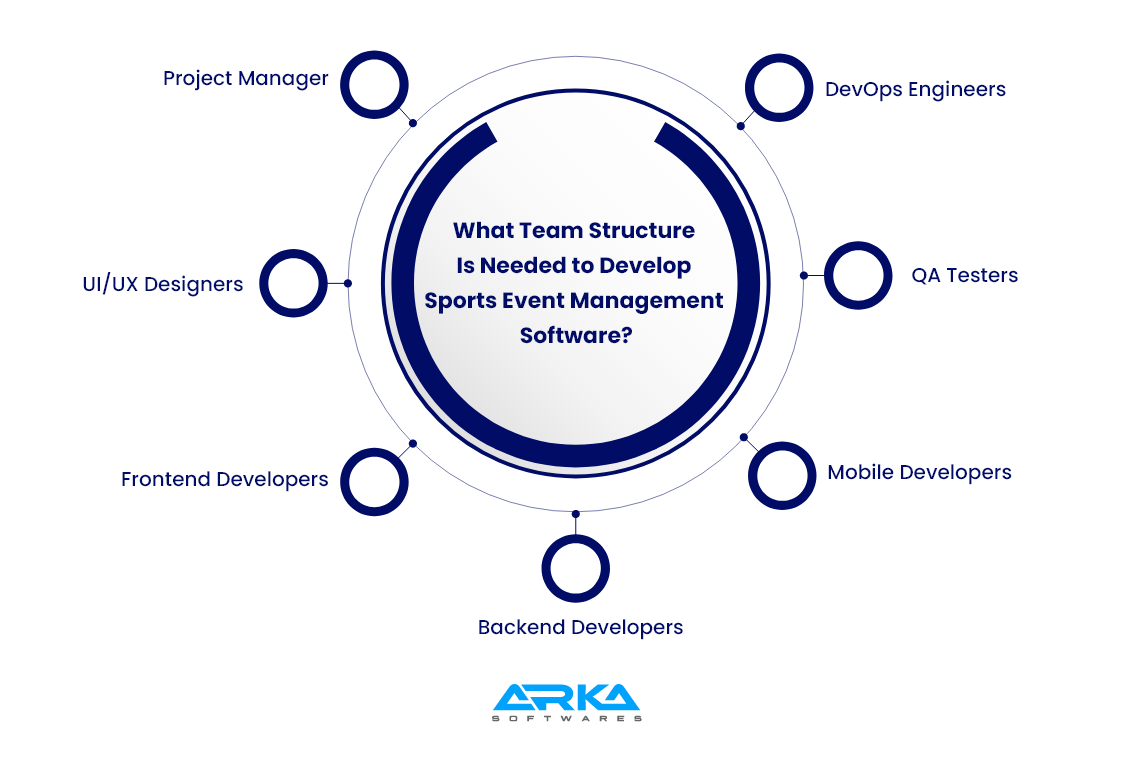
Choosing an experienced sports software development partner ensures that you get a reliable, scalable, and user-friendly solution. An experienced team understands the intricacies of sports events and can provide valuable insights into the development process, helping you avoid common pitfalls and ensure timely delivery.
Choosing Arka Softwares for Sports Event Management Software Development ensures you receive a tailored solution that meets the unique challenges of managing sports events. Their expertise in the sports industry, combined with a user-friendly interface, enhances the overall experience for organizers and participants.
Arka Softwares offers comprehensive features like registration management, scheduling, and ticketing, all while ensuring scalability as your events grow. With a focus on innovation and ongoing support, they provide reliable, cost-effective solutions that align with your specific needs, making them a trusted partner in successful sports event management.
Developing sports event management software requires a clear understanding of user needs, robust functionality, and seamless integration with existing systems.
Prioritizing user experience, data security, and scalability will ensure the software meets the demands of diverse sporting events.
Continuous feedback and iteration are essential for long-term success, enabling organizers to streamline processes, enhance engagement, and create memorable experiences for participants and spectators alike.
With careful planning and execution, such software can significantly elevate the standard of sports event management.
Key features typically include event registration and ticketing, scheduling and calendar management, participant communication tools, payment processing, and analytics for tracking attendance and revenue.
Development timelines can vary widely based on complexity, but it generally takes between 3 and 6 months to build a comprehensive solution, including planning, design, development, and testing phases.
Common technologies include frontend frameworks like React or Angular, backend solutions such as Node.js or Django, databases like PostgreSQL or MongoDB, and cloud hosting services like AWS or Google Cloud.
Development costs can range from $20,000 to over $100,000, depending on features, complexity, and the development team’s location and expertise.
Yes, effective sports event management software can integrate with third-party applications such as CRM systems, social media platforms, and payment gateways to enhance functionality and streamline processes.